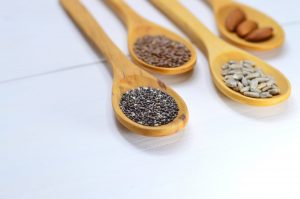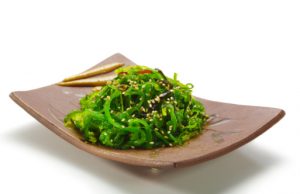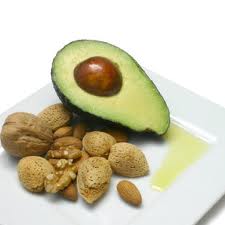Hypothyroidism Lifestyle: Foods to Avoid, Essential Oils to Use & Activities to Do
Hypothyroidism Lifestyle: Foods to Avoid, Essential Oils to Use & Activities to Do

If you are living with hypothyroidism or under-active thyroid—a condition that causes the thyroid glands to produce too few hormones, you may be living with reduced energy and increasing weight gain. Other symptoms may include depressive or irregular mood swings, slow heartbeats, cold sensitivity, and/or menstrual irregularities. The thyroid glands help to regulate the body’s metabolism (the rate at which food is converted into energy).
If you want to approach living with hypothyroidism in a natural way, follow the suggestions provided below.
Avoid Certain Vegetables, GMO’s and Nuts

Scientific studies have found that eating cruciferous vegetables, such as cabbage, cauliflower, Brussels sprouts, turnips, cassava, soybeans, and mustard greens, may hinder thyroid functioning. Nuts provide healthy fats, protein and a variety of helpful nutrients, but stay away from peanuts, peanut butter and pine nuts, for they impair thyroid functioning, as well. Choose almonds, Brazil nuts, walnuts and seeds (hemp, flax and chia). Steer clear from any foods labeled GMO, especially soy product.
Processed or Enriched Carbohydrates
Processed or enriched carbohydrates, such as white flour and sugar, are foods that have lost valuable amounts of nutrients during food processing. Not only is refined foods null and void of vitamins and nutrients, they are considered to nutritionists as “dead food.” Processed foods bring about negative impacts on blood sugar, trigger mood swings, and are very acidic and inflammatory to the body (not good for people living with hypothyroidism, for it may lead to bloating and constipation). Too much gluten in the body from grains is also not the best for people fighting low production of hormones. Limit your intake of gluten (even the whole grain kind). Instead, replace your processed foods for fresh starchy vegetables, such as potatoes, squashes, sprouted grains.
Saturated Fats and Trans Fatty Acids
Saturated fats and trans fatty acids, or trans fats, are considered unhealthy fats that can increase the risk for high cholesterol, high blood pressure and heart disease. Limit and avoid saturated (animal fats and animal by-products) and trans fats (often found in fast food, fried foods, processed meats and cheeses as well as cookies, crackers and processed frozen foods) and increase intake of omega-3 fats from krill, flax, hemp and chia seeds and nuts, such as almonds and walnuts. You will see your immune system functioning and brain respond better!
What to Eat?

One of the most potent and powerful foods in helping the thyroid to function normally is sea vegetables and blue-green algae because of the high iodine content. I suggest eating these foods daily: Iodized sea salt, seaweed, sea kelp, and other sea vegetables, small saltwater fish.
Tyrosine and selenium

Tyrosine and selenium are also important for proper thyroid function—to increase your intake of these compounds, consume fish, meat, chicken, turkey, dairy, avocados, almonds, seeds, wheat germ, and beans.
Supplements
“Consider adding both a B-vitamin complex and a fatty-acid supplement (such as fish oil) to your diet (using capsules) to further regulate your body's production of hormones. Fish oil has been shown to positively affect thyroid function. To reap these benefits, consume 5 to 10 g of a high-quality fish oil in capsule form daily.” (EHow)
Also, check out the use of turmeric and curcumin for incredible benefits!
Essential oils

For people who use essential oils, the following essential oils are natural, soothing, contain antioxidants, and supports healthy gastrointestinal function and maintain healthy digestion*
➣ 10 drops Clove essential oil
➣ 10 drops Peppermint essential oil
➣ 10 drops Lemongrass essential oil
Use in combination with Fractionated Coconut Oil along spine and bottoms of the feet 2 times daily or in veggie capsules (3 capsules. One capsule for clove, one for peppermint and one for lemongrass).
or
➣ Place 1 drop of Frankincense Oil under the tongue (intra-oral) daily
➣ Rub 2 drops of Frankincense Oil on throat/thyroid area
➣ Rub Balance Oil Blend on bottoms of feet, nightly
➣ One a day Multi-Vitamins daily
➣ Diffuse Myrrh essential oils in the air
or
➣ Mix 3 drops of some or all of the following oils in a capsule and take every other day; Rosemary, Lemongrass, Geranium, Grapefruit and/or Clove
*These statements have not been evaluated by the Food and Drug Administration. These suggested products are not intended to diagnose, treat, cure or prevent any disease.
Activities & Exercises
Aerobic exercises and strength training is very improves the metabolic functioning of the body, so light to moderate. Best exercises from Thyroid Guide recommends: rowing, swimming, walking, cycling, hiking and dancing—activities that get your heart pumping and cause you to sweat—as good aerobic exercise. Aerobic exercise strengthens the heart and lungs and burn calories. Exercising is a great body circulation promoter and natural mood elevator and antidepressant that can help the depression that often accompanies an under-functioning thyroid.
If you do not have time for a brisk 30 minute walk 5 days a week (recommended), then strength training exercises done at the gym or in the comfort of your home will also do the trick to protect the joints, tendons and ligaments and build strength for handling everyday activities such as carrying groceries. Practice lunges, leg raises and pushups or work with light kettle bells.
Additional sources: Livestrong, Thyroid-Guide.org, webMD